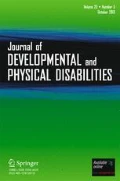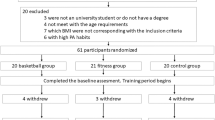Abstract
This study was aimed at investigating the effects of the inclusive soccer program on psychological benefits in young adults with and without intellectual disabilities (ID). In the current study, sport motivation, measured as the relative autonomy index, visuo-spatial working memory and selective attention aspects of executive function, measured as the computerized Corsi Block Tapping Test and Eriksen Flanker Test were assessed. Ten participants with ID and ten typical partners practiced soccer activities together for 50-min each session, twice a week for fifteen-week long. The whole practice sessions were monitored at moderate exercise intensity. Measures were tested at pre- and post- program. Our results indicated that the typical partners improved the performance in Corsi Block Tapping Test because partners needed to search and select participants with ID and targets simultaneously in a spatial field. The increased relative autonomy index was noted in participants with ID. They also improved response accuracy in Eriksen Flanker Test because they were requested to evaluate, analyze, and take the appropriate actions at all times during practice. Thus, the demanding of inclusive soccer activities might promote sport motivation in participants with ID and lead to different cognitive benefits in participants with ID and their partners respectively. Future research is needed to examine with a larger sample size. In addition, more cognitive and physiological measures should be applied to explore the underlying mechanisms among individuals with ID.
Similar content being viewed by others
References
Alesi, M., Bianco, A., Luppina, G., Palma, A., & Pepi, A. (2016). Improving children's coordinative skills and executive functions: The effects of a football exercise program. Perceptual and Motor Skills, 122(1), 27–46.
Baddeley, A. D., & Hitch, G. J. (1994). Developments in the concept of working memory. Neuropsychology, 8(4), 485–493.
Bittles, A., Petterson, B., Sullivan, S., Hussain, R., Glasson, E., & Montgomery, P. (2002). The influence of intellectual disability on life expectancy. The Journals of Gerontology Series A: Biological Sciences and Medical Sciences, 57(7), M470–M472.
Chang, Y., Tsai, Y. J., Chen, T. T., & Hung, T. M. (2013). The impacts of coordinative exercise on executive function in kindergarten children: An ERP study. Experimental Brain Research, 225, 187–196.
Chang, Y. K., & Etnier, J. L. (2009). Exploring the dose-response relationship between resistance exercise intensity and cognitive function. Journal of Sport and Exercise Psychology, 31(5), 640–656.
Chen, C. C., Ringenbach, S. D. R., Crews, D., Kulinna, P. H., & Amazeen, E. L. (2015). The association between a single bout of moderate physical activity and executive function in young adults with Down syndrome: A preliminary study. Journal of Intellectual Disability Research, 59(7), 589–598.
Chen, C. C., Kelsey, A., Mulvey, G., & Ringenbach, S. D. (2016). Examining the Davidson’s model via an exercise variable in individuals with intellectual disabilities. International Journal of Developmental Disabilities, 62(1), 70–75.
Chen, C. C., & Ringenbach, S. D. R. (2016). Dose-response relationship between intensity of exercise and cognitive performance in individuals with down syndrome: A preliminary study. Journal of Intellectual Disability Research, 60(6), 606–614.
Davis, C. L., Tomporowski, P. D., McDowell, J. E., Austin, B. P., Miller, P. H., Yanasak, N. E., Allison, J. D., . . . Naglieri, J. A. (2011). Exercise improves executive function and achievement and alters brain activation in overweight children: A randomized controlled trial. Health Psychology, 30(1), 91–98.
Diamond, A. (2000). Close interrelation of motor development and cognitive development and of the cerebellum and prefrontal cortex. Child Development, 71(1), 44–56.
Dick, M. B., Doran, E., Phelan, M., & Lott, I. T. (2016). Cognitive profiles on the severe impairment battery are similar in Alzheimer’s disease and down syndrome with dementia. Alzheimer Disease and Associated Disorders, 30(3), 251–257.
Erickson, K. I., & Kramer, A. F. (2009). Aerobic exercise effects on cognitive and neural plasticity in older adults. British Journal of Sports Medicine, 43(1), 22–24.
Fernhall, B. O., McCubbin, J. A., Pitetti, K. H., Rintala, P. A. U. L. I., Rimmer, J. H., Millar, A. L., & De Silva, A. N. T. O. N. I. O. (2001). Prediction of maximal heart rate in individuals with mental retardation. Medicine and Science in Sports and Exercise, 33(10), 1655–1660.
Funahashi, S. (2001). Neuronal mechanisms of executive control by the prefrontal cortex. Neuroscience Research, 39(2), 147–165.
Henry, L., & Winfield, J. (2010). Working memory and educational achievement in children with intellectual disabilities. Journal of Intellectual Disability Research, 54(4), 354–365.
Honeycutt, A. A., Grosse, S. D., Dunlap, L. J., Schendel, D. E., Chen, H., Brann, E., & al Homsi, G. (2003). Economic costs of mental retardation, cerebral palsy, hearing loss, and vision impairment. In Using survey data to study disability: Results from the National Health Survey on disability (pp. 207–228). Emerald Group Publishing Limited.
Kratz, O., Studer, P., Malcherek, S., Erbe, K., Moll, G. H., & Heinrich, H. (2011). Attentional processes in children with ADHD: An event-related potential study using the attention network test. International Journal of Psychophysiology, 81(2), 82–90.
Menear, K. (2007). Parents’ perceptions of health and physical activity needs of children with down syndrome. Down’s Syndrome Research and Practice, 12(1), 60–68.
McConkey, R., Dowling, S., Hassan, D., & Menke, S. (2013). Promoting social inclusion through unified sports for youth with intellectual disabilities: A five-nation study. Journal of Intellectual Disability Research, 57(10), 923–935.
McLoughlin, G., Albrecht, B., Banaschewski, T., Rothenberger, A., Brandeis, D., Asherson, P., & Kuntsi, J. (2010). Electrophysiological evidence for abnormal preparatory states and inhibitory processing in adult ADHD. Behavioral and Brain Functions, 6(1), 66.
Özer, D., Baran, F., Aktop, A., Nalbant, S., Ağlamış, E., & Hutzler, Y. (2012). Effects of a Special Olympics unified sports soccer program on psycho-social attributes of youth with and without intellectual disability. Research in Developmental Disabilities, 33(1), 229–239.
Pastula, R. M., Stopka, C. B., Delisle, A. T., & Hass, C. J. (2012). Effect of moderate-intensity exercise training on the cognitive function of young adults with intellectual disabilities. The Journal of Strength & Conditioning Research, 26(12), 3441–3448.
Ringenbach, S. D., Albert, A. R., Chen, C. C., & Alberts, J. L. (2014). Acute bouts of assisted cycling improves cognitive and upper extremity movement functions in adolescents with down syndrome. Mental Retardation, 52(2), 124–135.
Schalock, R., Borthwick-Duffy, S., Bradley, V., Buntinx, W., Coulter, D., Craig, E., et al. (2010). Intellectual disability: Definition, classification, and systems of support (11th ed.). Washington: American Association on Intellectual and Developmental Disabilities.
Schuchardt, K., Gebhardt, M., & Mäehler, C. (2010). Working memory functions in children with different degrees of intellectual disability. Journal of Intellectual Disability Research, 54(4), 346–353.
Siperstein, G. N., Glick, G. C., & Parker, R. C. (2009). Social inclusion of children with intellectual disabilities in a recreational setting. Intellectual and Developmental Disabilities, 47(2), 97–107.
Siperstein, G. N., Norins, J., Corbin, S., & Shriver, T. (2003). Estudio multinacional de actitudes hacia las personas con discapacidad intelectual. Washington: Center for Social Development and Education. University of Massachusetts. Boston. Comité Olímpico Internacional.
Stanish, H. I., & Temple, V. A. (2012). Efficacy of a peer-guided exercise programme for adolescents with intellectual disability. Journal of Applied Research in Intellectual Disabilities, 25(4), 319–328.
Stoodley, C. J., & Schmahmann, J. D. (2009). Functional topography in the human cerebellum: A meta-analysis of neuroimaging studies. Neuroimage, 44, 489–501.
Tanaka, H., Monahan, K. D., & Seals, D. R. (2001). Age-predicted maximal heart rate revisited. Journal of the American College of Cardiology, 37(1), 153–156.
Vestberg, T., Gustafson, R., Maurex, L., Ingvar, M., & Petrovic, P. (2012). Executive functions predict the success of top-soccer players. PLoS One, 7(4), e34731.
Verburgh, L., Scherder, E. J., van Lange, P. A., & Oosterlaan, J. (2014). Executive functioning in highly talented soccer players. PLoS One, 9(3), e91254.
Vicari, S., Carlesimo, A., & Caltagirone, C. (1995). Short-term memory in persons with intellectual disabilities and Down's syndrome. Journal of Intellectual Disability Research, 39(6), 532–537.
Vidoni, E. D., Johnson, D. K., Morris, J. K., Van Sciver, A., Greer, C. S., Billinger, S. A., et al. (2015). Dose-response of aerobic exercise on cognition: A community-based, pilot randomized controlled trial. PLoS One, 10(7), e0131647.
Vogt, T., Schneider, S., Anneken, V., & Strüder, H. K. (2013). Moderate cycling exercise enhances neurocognitive processing in adolescents with intellectual and developmental disabilities. Research in Developmental Disabilities, 34(9), 2708–2716.
Zahariadis, P. N., Tsorbatzoudis, H., & Grouios, G. (2005). The sport motivation scale for children: Preliminary analysis in physical education classes. Perceptual and Motor Skills, 101(1), 43–54.
Acknowledgements
We appreciate Amanda Bailey, Emily Wood, Emily Wise, Meredith Bass, Rebekah Shirley, Mary Enger, Aimee Pride, Olivia Lauren, Beth Brinkley, Katie McWhirter, Hannah Hardwick, Madelyn Winstead, and Meg Crocker who were the students who helped with data collection and participated in soccer practice as partners.
Funding
This research was supported by the National Research Foundation of Korea Grant funded by the Korean Government (MOE) (NRF-2017S1A2A2039405) and Mississippi State University College of Education Undergraduate Research Grant.
Author information
Authors and Affiliations
Corresponding author
Ethics declarations
Ethical Approval
All procedures performed in studies involving human participants were in accordance with the ethical standards of the institutional and/or national research committee and with the 1964 Helsinki declaration and its later amendments or comparable ethical standards.
Informed Consent
Informed consent was obtained from all individual participants as well as their parents/gurdians included in the study.
Conflict of Interest
The authors have no conflicts of interest to declare in reference to this work.
Additional information
Publisher’s Note
Springer Nature remains neutral with regard to jurisdictional claims in published maps and institutional affiliations.
Rights and permissions
About this article
Cite this article
Chen, CC.(., Ryuh, Y., Hardwick, H. et al. Psychological Benefits of Inclusive Soccer Program in Young Adults with and without Intellectual Disabilities. J Dev Phys Disabil 31, 847–861 (2019). https://doi.org/10.1007/s10882-019-09677-1
Published:
Issue Date:
DOI: https://doi.org/10.1007/s10882-019-09677-1




